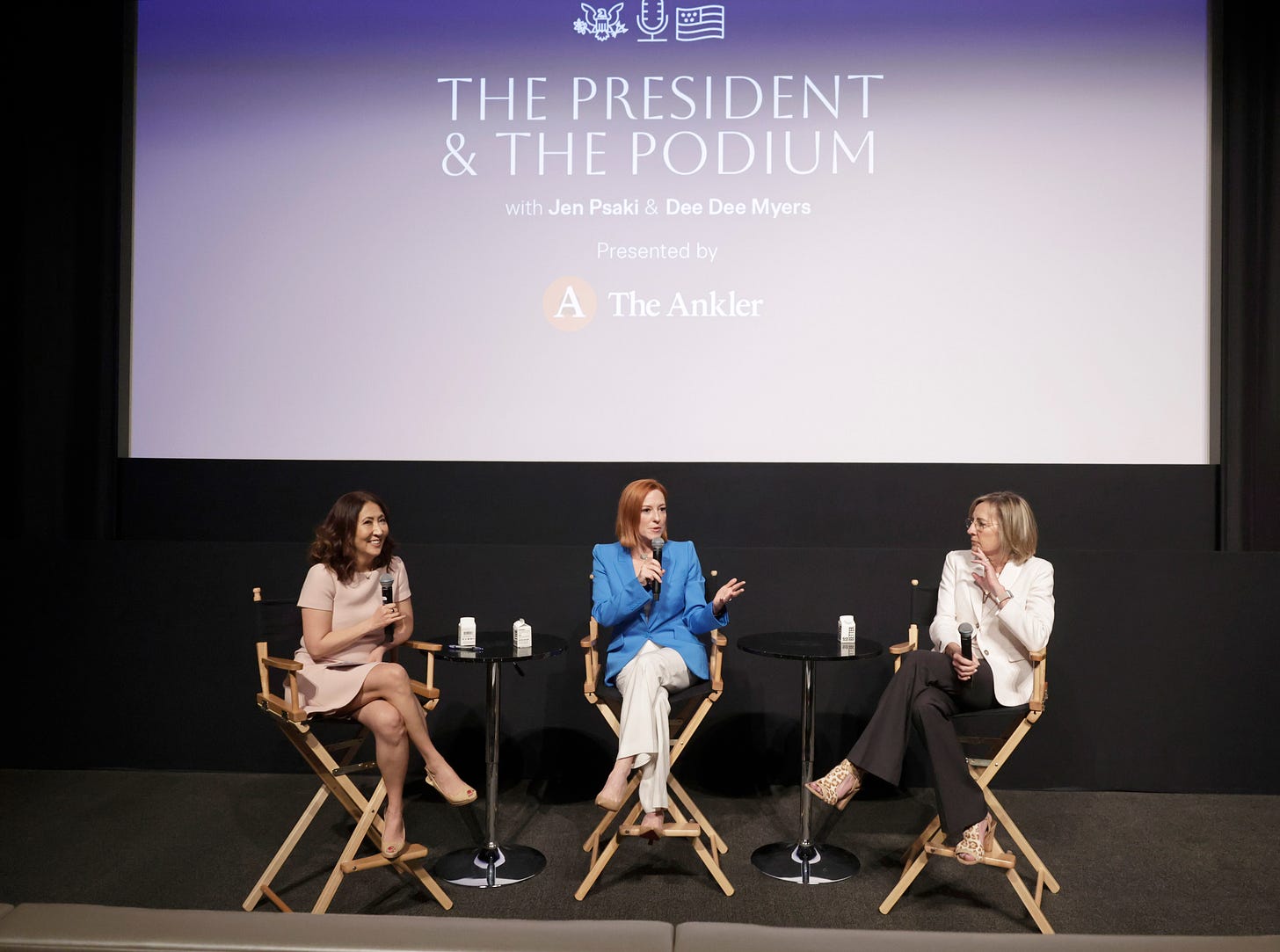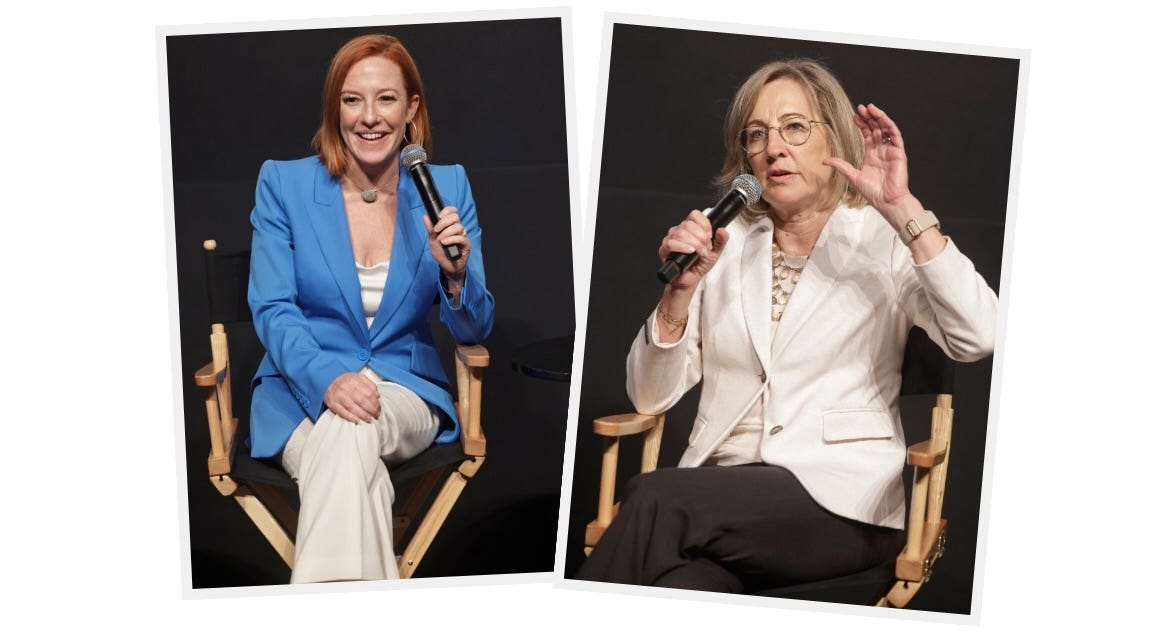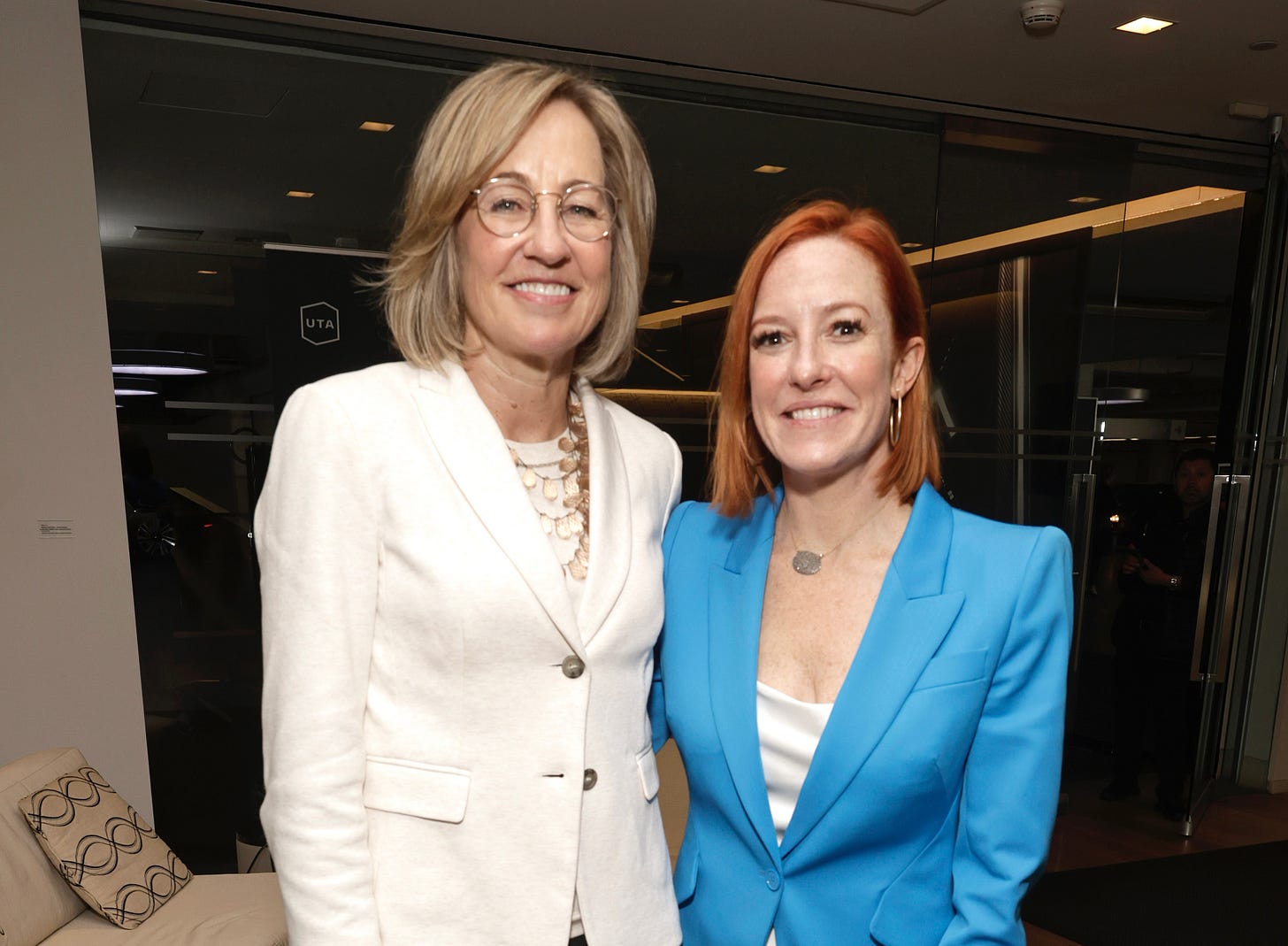Two White House Press Secretaries Walk Into Hollywood . . .
Jen Psaki & Dee Dee Myers' straight talk on grim polling numbers, Biden and Bibi, and ‘double haters’ before a riveted SRO audience

Sitting down with Jen Psaki and Dee Dee Myers is like being plunked onto the set of The West Wing: 2024 — you’re instantly immersed in a rapid-fire, Beltway-shorthand barrage of sharp political commentary, insights and true laugh-out-loud moments.
It’s what you’d expect from Psaki, President Joe Biden’s former White House secretary who’s now hosting her own twice-weekly show on MSNBC, and Myers, Bill Clinton’s former White House secretary and first-ever woman in that role — and the inspiration for The West Wing’s C. J. Cregg. (Today she serves as a special advisor to Gov. Gavin Newsom.)
These two comms and strategy gurus joined me at the UTA Theatre in Beverly Hills on May 14 for “The President & The Podium,” a wide-ranging conversation about Joe Biden and Donald Trump, stomach-churning poll numbers, Israel/Gaza, Fox News, abortion, and Gov. Newsom and California’s impact on the political landscape. (Warning: If you have butterflies in your stomach about the presidential election, their wings will flutter faster after reading this conversation.)
Psaki also shared a few telling and memorable anecdotes from her new New York Times best-seller, Say More: Lessons from Work, the White House, and the World, and made a point of highlighting the bright spots for Biden’s campaign.
Myers was less optimistic but just as passionate about the dangers of Trump’s allure for disaffected Americans who “wanna blow up the system.” And stay tuned to hear about the “double haters.”
Edited for length and clarity, I hope you enjoy these excerpts from our conversation:
Janice Min: Let’s start with the recent polls — in the New York Times/Siena Poll, Donald Trump leads Joe Biden in five states: Michigan, Arizona, Nevada, Georgia and Pennsylvania. How worried should Democrats be right now?
Jen Psaki: It's good if Democrats are worried, because if Democrats weren't worried, they wouldn't be working hard. But I'm just going to calm the world down for a second. If you're on the Biden campaign, these are not great polls, I'm not going to sugarcoat that. But if you look at likely voters, [Trump’s lead] actually narrows quite a bit in a lot of these states.
There are also some data that stuck out to me as troubling — but as an opportunity. Twenty percent of people blamed Joe Biden for the Dobbs decision (the Supreme Court’s overturning of Roe v. Wade). Now, that's crazy, but that is an opportunity for the Biden team.
There's more work to be done, more contrast to be drawn. Running nervous is better than running complacent.
Dee Dee Myers: I have probably a less optimistic view. [To Psaki] We can do good cop, bad cop, because I do think there's a couple of troubling things. One is the trend, right? Until the fall, Biden led in most polls. And now we've seen Trump not only take the lead, but maintain it, at least for now.
One of the things that I learned from Bill Clinton — I learned pretty much everything I know about politics from Bill Clinton — is that most campaigns are about change, and they're about the future. One of the troubling things in that New York Times poll is only 13 percent of respondents thought Joe Biden would bring change to the country. That really jumped out at me.
Not everybody thought Donald Trump would bring good change, obviously, but a lot of people thought he would bring change at a time when the country is very disaffected.
JP: A lot of the [Democratic] Senate candidates are running ahead of Biden. That's a bad feeling if you're the Biden campaign, but it actually means there's Democrats to be had.
DM: This whole thing is going to be decided by a very small number of people. Fifteen percent of Americans live in six swing states, right? So you've got five or six states that comprise 15 percent of the American electorate, 77 electoral votes, and nothing else matters.
[To the room of Californians] We do not matter, people. Unless you’re writing checks.
JM: Mark Penn, the pollster, had an opinion piece in the New York Times about messaging, which is a big theme of Jen’s book. Bill Clinton had a message, which was building a bridge to the 21st century. George W. Bush was compassionate conservatism. Barack Obama was hope and change. Then obviously Donald Trump is make America great again. What is Joe Biden's message?
JP: Obama was hope and change in ’08. He wasn't hope and change in 2012. In 2012, he was, ‘Give me four more years to finish the job’ — which is essentially what Joe Biden's message is.
DM: What they've kind of reverted to for now is ‘Trump is horrible,’ which is compelling. It's low-hanging fruit. How can it be that you can remind people of everything that he's done — and they still aren't convinced that they should vote for Joe Biden?
He needs to have a clearer, future-oriented message. What is he going to do? The economy's not working for [voters]. Inflation has driven up prices of things like food as much as 25 percent. Wages have grown a little bit, but people don't buy the message that the economy is good.
JP: The data argument and the ‘my record’ argument is just not a good argument.
DM: Our candidates love to talk about their records. ‘I spent four years, and I accomplished all this stuff, and you people won't let me talk about it and that's why things aren't going well.’ And it's like, ‘Well, not really, Mr. President.’
JP: You can't tell people how to feel about the economy. And the impact of inflation is not on middle- and upper-class Americans; it's on lower-income Americans, people who are younger, who have higher credit-card debt. These are a lot of the people who are not committing to vote for Biden. They’re like, ‘I don't care about the GDP number. I care that my interest rate on my credit card is so high.’
DM: And telling people that the rate of growth of inflation has slowed down, I'm going to say that's not a winning campaign theme.
JP: It is hard with presidents to extract them from the laundry list of accomplishments and data . . .But [Biden’s] much better when he's come back from a trip to Pennsylvania, or a trip to Delaware, where he's gone to church and talked to people and is talking like a normal human being.
JM: Let's talk about Trump — even with the trial in New York, the legal woes, the crazy violation of a gag order, the $83 million verdict for E. Jean Carroll, 40 percent of America is undeterred. What are they seeing that we are not seeing?
JP: His message is very dangerous, but it's also effective because it's simple and consistent. He is appealing to the aggrieved, the people who hate institutions and hate government and feel like they've been let down. No, I don't think he cares about those people, but that message appeals to people, and they feel it's an emotional connection.
DM: I don't think that this [hush-money] trial is going to matter one whit. Even if he's convicted, it's already baked in that this is a sham trial, that it's trumped-up charges, and it's not going to change a thing.
Trump's superpower is that he recognizes that there's this whole disaffected group of working-class people, on the lower end of the economic scale, who aren't doing well and haven't been for 40 years, while people with a college degree have doubled their wealth, basically, over the same time period.
The number-one predictor now of vote is not class, it's not race, it's educational attainment. People feel the game is rigged. They're sick of it. They know that there's no American dream for people who don't have a college degree or don't live in the right communities, or haven't had the right opportunities, and they wanna blow up the system.
Trump understands that, and the more stuff he says that's crazy, the more people like it because it reflects their done-with-the-system-ness.

JP: A tiny bright spot is that the issue that has had a surprising impact in special election after special election and in ballot referendums is abortion rights. Abortion rights was not an issue in 2020, right, because [Roe] hadn't been overturned.
DM: It’s going to be much more important in states where abortion's on the ballot. Like Arizona. And Nevada.
JM: Should we turn to an easier topic? Israel/Gaza? (Audience laughs.) Biden says one thing, does another, we’ve seen these campus protests flare. What should he be doing?
JP: As I used to say, there's a lot packed into that question. So let's try to unravel it. The challenge of diplomacy and foreign policy is that it's very difficult to communicate around. A lot of what's happening is behind the scenes, and part of diplomacy is using an escalation of leverage, right? So they're having these conversations — Bill Burns, the CIA director, Tony Blinken, the Secretary of State, they're back and forth, back and forth, back and forth. They're conduits between the Israeli government, the Egyptians and others in the Middle East to try to work to get to a ceasefire.
And they're saying to Netanyahu, Biden is saying, ‘If you don't de-escalate this, I'm going to have to say something publicly.’ Then he says something publicly. ‘If you don't deescalate, I'm going to have to threaten to pull back military assistance.’ That's exactly what he does.
This is what the Biden administration is doing. This is how diplomacy works throughout history. Reagan, Eisenhower, Clinton. This is how it works.
What I think people don't talk about enough is that Prime Minister Netanyahu, who was very unpopular before the horrific events of October 7, there's political survival at stake for him now. And he is not waiting, nor has he ever, for the United States to tell him what to do.
DM: I think they moved too slow. How many thousands of Gazans have to die? How do we get to ceasefire? Then how do we get to a two-state solution? That's cost Biden. There's no cost to Trump from sitting on the outside, right? The Republican base is pretty united. This has divided the Democratic base, and that is another really complicated factor for Biden. It's very, very difficult, maybe even impossible to thread the needle.
Then there's the meta, the optics, of it. Joe Biden was elected to bring stability back, right? Let's get the grownups back in the room. Let's calm everything down. Now we've got two wars, a very dangerous situation in Asia and a humanitarian crisis — and all of this chaos just undermines the Biden brand.
JM: Let’s talk about the coalition issue with the Democrats. Another thing we saw in the New York Times/Siena polling is that many young Black and brown people want to vote for Trump. How can the Democratic Party come back together?
DM: We're in a fundamentally transitional period, and whoever becomes president is going to have a very difficult presidency, right? Because the country obviously is super divided, and you do see Black and brown young people stepping back and being willing to consider voting for Donald Trump — in 2016, if you'd said that, people would have said, ‘Okay, next, because you don't know what you're talking about.’
The question is, where are we [Democrats] going to end up? Are we going to create a better message and set of policies that will help people feel like they have a shot at the future again? The Democratic Party can no longer take for granted those three groups: young people, Black people, brown people. And I just don't know that Joe Biden is the person to bring them back. Obviously, I hope he wins. He still has a good chance to — this is a jump ball, for sure. But as we look beyond November, how do we address the fundamental inequities that are so prevalent in our country?
JP: The risk is a lot of [voters] staying home. Pollsters will kind of shorthand these people as double haters, which is such a funny term. . . .What that means is people who hate both candidates. Hate is a strong word, as I tell my children, but it still might be applicable. Whomever can get more double haters [to turn out to vote] is probably gonna be the one who wins.
DM: Some of the swing voters are also people who are not very engaged. They don't know very much. So they're gonna vote on emotion. By the way, people always vote on emotion. People still, at the end of the day, they vote with their hearts.
JP: They vote on vibes.
JM: Dee Dee didn't quite have the full right-wing machine to deal with that you did, Jen. You talk in the book about how Peter Doocy, son of Fox and Friends’ Steve Doocy, was a constant thorn in your side in the press room.
JP: People often ask me, ‘how much did you hate that guy?’ And I'm always like, ‘No, I didn't hate him at all. I feel like it would be a real mind-bend to work for Fox. It feels like a traumatizing experience he has to live through every day.
That aside, it's quite predictable what they were going to ask — if there was a winding roundabout [on Fox News] of, you know, ‘migrants at the border, here to kill all of you,’ you knew they were going to ask about immigration that day. So I didn't see it as necessarily winning the argument with him as much as using it as a forum to provide what our points were, right? When I came in, we followed Trump and an administration that was like, ‘inject bleach, you're all liars, we hate the media.’ So there was a very low bar for me.
JM: This is a good segue to Gov. Newsom, and this is a compliment to Gov. Newsom: He fights like a Republican. Dee Dee, you're with him a lot. Where does that come from?
DM: I think that Gov. Newsom looks around and feels like sometimes we [Democrats] pull our punches, right? That we have a better argument. Somebody needs to go out there and sometimes punch the other side in the face. He actually enjoys that quite a bit, because they make their arguments. They align their fake facts. They never back down. And they just keep going. So with actual true facts, he adopted a similar kind of approach.
JM: Lots of people, if Biden had chosen not to run, might have liked Gov. Newsom to step up. Do you see a Democrat from California ever winning the presidency in, say, 2028?
DM: We live in a progressive state. We have a very progressive legislature. We have a supermajority of Democrats. That's a tough load for any Democrat to carry into a national election.
If anyone can go out there and make the case, it's him. But whether he will want to, whether the environment will support that, who knows? He certainly isn't making any decisions about the future at this point, other than he's going to spend as much time as he has in the next couple months campaigning for Biden.
JM: What is the role of California in the presidential election? Celebrities showing up to fundraisers, to the convention — does that help or hurt?
JP: Well, money matters. I'm not saying that's the only value, but money matters, because Biden has an enormous cash advantage right now that is helpful because they have, like, 47 offices in Wisconsin.
It has to be authentic, but for a celebrity who has a big platform — do I think it's super effective for people who care about abortion rights, who have a huge platform, to go out there and be like, ‘Hey everybody, Trump got three justices onto the Supreme Court, which is why your abortion rights are at risk’? Yeah, I do. Sometimes there's hemming and hawing about this among Democrats. It's a little bit silly because people who have voices and want to make an authentic argument, it is powerful and effective. Comedians also are a part of this conversation that is so important right now because they can transcend the debates that people tune out.
There's real critiques we've given of what the Biden campaign is doing and isn't doing. But also this [Trump] trial, even if it isn't going to matter, it's blocking out the sun of earned media. It's very hard to break through. So the way they do that is through paid media — digital, targeted — and you need money to do that.
DM: It is just a fact that the real value of California is money, and they're both going to be here in the next two weeks, raising money.
JM: We’ll end on a lighting round. Kamala Harris. Is she a liability?
JP: I don't think so. This doesn't always get picked up in national press, but she's been out there on college campuses where she is very warmly welcomed and people love having her there.
She's been out there doing abortion rights events in a way that is very effective in states where people actually care and gets them energized. The first year kind of defined who people thought she was, and she's been digging out of that in some ways.
DM: She had a rough first year — as all vice presidents do, by the way. We're not big fans of vice presidents, and there's one thing in America we kind of all agree on: We really don't like women in power.
JM: RFK Jr.
DM: Wacko.
JP: Brain worms.





